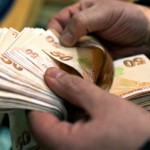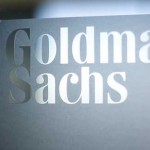Emerging Currencies Halt Rally as Singapore Flags Growth Risks

-
Malaysian ringgit leads declines after Singapore eases policy
-
Won sinks on Korean election shock as dollar extends advance
Emerging-market currencies fell for the first time in six days as Singapore surprised markets by easing monetary policy, spurring speculation other Asian central banks will follow suit.
Malaysia’s ringgit dropped the most in three weeks and all of its regional counterparts weakened as Singapore switched to a neutral policy of zero percent appreciation of its dollar after growth in the city-state ground to a halt. India and Indonesia have cut borrowing costs this year, while Japan adopted negative interest rates. South Korea’s won and bonds fell after the nation’s ruling party unexpectedly failed to win a majority in parliamentary elections. A gauge of developing-nation stocks rose to a five-month high.
“If the Monetary Authority of Singapore is easing, then it produces more scope for easing elsewhere,” said Mirza Baig, the head of Asia Pacific foreign-exchange and interest-rate strategy at BNP Paribas SA. “Singapore is seen as a bit of a bellwether for the region.”
Emerging-market assets, which have rebounded this year as the Federal Reserve reaffirmed its accommodative stance and commodity prices recovered, received an additional boost this week as an improvement in Chinese trade data pointed to a stabilization in the world’s second-largest economy. The International Monetary Fund’s warning on Tuesday that a prolonged period of slow global growth has left the world economy more exposed to negative shocks is tempering some of the optimism.
Currencies
The MSCI Emerging Markets Currency Index fell 0.2 percent as of 12:39 p.m. in Hong Kong, halting a 1.2 percent advance over the past five days. The measure is up 3.8 percent in 2016 after declining in each of the last three years. A gauge of the greenback rose 0.2 percent, extending Wednesday’s jump that was the biggest in three weeks.
The ringgit weakened 0.8 percent, the Singapore dollar depreciated 0.9 percent and Indonesia’s rupiah fell 0.5 percent. The won dropped 0.7 percent from its close on Tuesday. South Korean markets were shut Wednesday for elections, and India and Thailand are closed Thursday.
“There’s a case for central banks in this region to do a little bit more to try to stimulate the economy,” Kelvin Tay, the regional chief investment officer at UBS AG’s wealth management business in Singapore. “We do expect a little bit more easing and interest-rates cuts in the region, given the fact that inflation is almost non-existent. Even though the price of oil has rebounded, it’s still very, very low.”
Seven of 21 economists surveyed by Bloomberg see the Bank of Korea cutting its policy rate by 25 basis points from a record low 1.5 percent by the end of June.
Bonds
South Korean sovereign bonds fell the most in five weeks following the ruling Saenuri Party’s electoral setback, which prompted its Chairman Kim Moo Sung to resign. The opposition picked up votes amid rising youth unemployment, a protracted slide in exports and weak consumer sentiment.
The yield on 10-year Korean notes rose five basis points to 1.84 percent, the biggest increase since March 11. The rate on similar-maturity Indonesian securities climbed three basis points to 7.46 percent, halting a six-day drop.
Stocks
The MSCI Emerging Markets Index of shares rose 0.2 percent to 845.95, set for its highest close since Nov. 6. The developing-nation stocks gauge has advanced 6.5 percent this year and is valued at 11.9 times the 12-month estimated earnings of its constituents. That compares with an 0.4 percent gain in the MSCI World Index, which is trading at a multiple of 16.
Five of 10 industry gauges in the emerging-market index advanced, led by material and finance companies. Hanwha Chemical Corp. surged 12 percent in Seoul, the most in almost 11 months after HI Investment & Securities Co. predicted the company will report record quarterly earnings. South Korea’s Kospi index climbed 1.3 percent to a four-month high.
The Hang Seng China Enterprises Index of mainland stocks listed in Hong Kong gained 1.1 percent to a three-month high, with China Life Insurance Co. advancing 3.9 percent. Vietnam’s benchmark measure climbed 0.9 percent, while gauges in the Philippines and Taiwan rose at least 0.2 percent. Indonesia’s Jakarta Composite Index fell for the first time in three days.
Source: Bloomberg





























